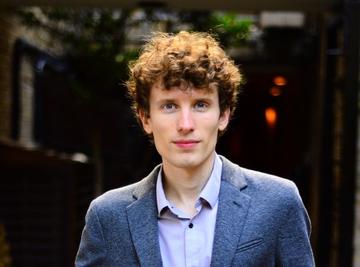Congratulations to Dr Rob Laidlow, Career Development Fellow in Music, on two recent successful funding bids for new and innovative music projects.

Dr Rob Laidlow, Career Development Fellow in Music at Jesus College.
Rob’s first grant has been made for the project ‘PLAY: Connecting Video Game Controllers, Musical Composition and Live Performance’. PLAY involves working with a research software engineer at the Royal Northern College of Music (RNCM) to create open-source software that turns common video game controllers into digital musical instruments, and offers a new perspective on how people interact with these objects.
The project also explores what composing for such a digital music instrument means in contemporary life by commissioning music written with the instrument by internationally active composers, and will offer gamers who are not familiar with a conventional instrument the opportunity to create high-quality, virtuosic, music.
Experimental group House of Bedlam will then give concerts in Oxford and Manchester using the instruments, with new music written by Bofan Ma, Hongshuo Fan, Ellen Sargen, and Rob himself. Concert audiences will also be invited to get hands-on with the equipment.
The project is funded by the Cultural Programme, with support from Jesus College and PRiSM – the centre for Practice & Research in Science & Music at the RNCM.
The second research project to have been awarded funding is ‘Everyday Objects and Musical Improvisation’, run in collaboration with the UdK, and funded by the Oxford-UdK Berlin Partnership in Arts and Humanities. ‘Everyday Objects and Musical Improvisation’ explores whether certain gestures linked to repetitive, and therefore embodied, interactions with everyday objects can be harnessed for musical expression. It also looks at whether common objects can be transformed into accessible musical instruments. Following a survey of objects and their associated gestures and activities, a prototype phase will produce interactive sound objects through collaboration with an interaction designer. The project will culminate in a workshop with professional musicians, and an analysis of the performances will offer insights into how these gestures can become instruments for musical expression.
